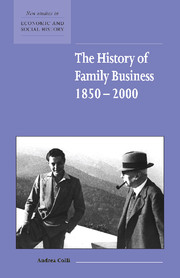Book contents
- Frontmatter
- Contents
- Introduction
- 1 Family business: nature and structure
- 2 Geographical, sectoral, and dimensional distribution of family firms
- 3 Family firms in the era of managerial enterprise
- 4 Conclusions
- Bibliographical essay
- Bibliography
- Index
- New Studies in Economic and Social History
- Previously published as Studies in Economic and Social History
- Economic History Society
4 - Conclusions
Published online by Cambridge University Press: 14 January 2010
- Frontmatter
- Contents
- Introduction
- 1 Family business: nature and structure
- 2 Geographical, sectoral, and dimensional distribution of family firms
- 3 Family firms in the era of managerial enterprise
- 4 Conclusions
- Bibliographical essay
- Bibliography
- Index
- New Studies in Economic and Social History
- Previously published as Studies in Economic and Social History
- Economic History Society
Summary
During the last two decades of the twentieth century, family business has often been centre-stage in the debates surrounding organisational change in business. Analysis has matured from a defence of personal capitalism to the discussion of international variations in business capabilities generally and family firms in particular. The aim of this study is to stress the relevance of ‘family business’ in the long run as well as its resilience across place and time. Despite the convergence hypothesis, the family firm has been a critical element in the industrialisation process, from the first industrial revolution to the post-Fordist era. A significant number of family firms, in both specialised and scale-intensive industries, have proved able to adapt themselves to transformations in markets and technology whilst maintaining their leadership over time. If there is ample evidence of the so-called ‘Buddenbrooks effect’, there are also numerous examples of successful fourth-, fifth-, and also sixth-generation family firms.
This study has also stressed the extreme diversity of family businesses, which include a range of types from large, multinational and complex corporations to middle-sized specialised producers, as well as the small and atomised production unit inside an industrial district. One important point to note is that, despite the relevance of the subject, there is a surprising lack of theoretical, economic research, and even then the family firm is usually identified with the small and elementary production unit while the empirical work has often been written from a purely ‘managerial’ point of view (Casson 2000: 197).
- Type
- Chapter
- Information
- The History of Family Business, 1850–2000 , pp. 73 - 76Publisher: Cambridge University PressPrint publication year: 2002

